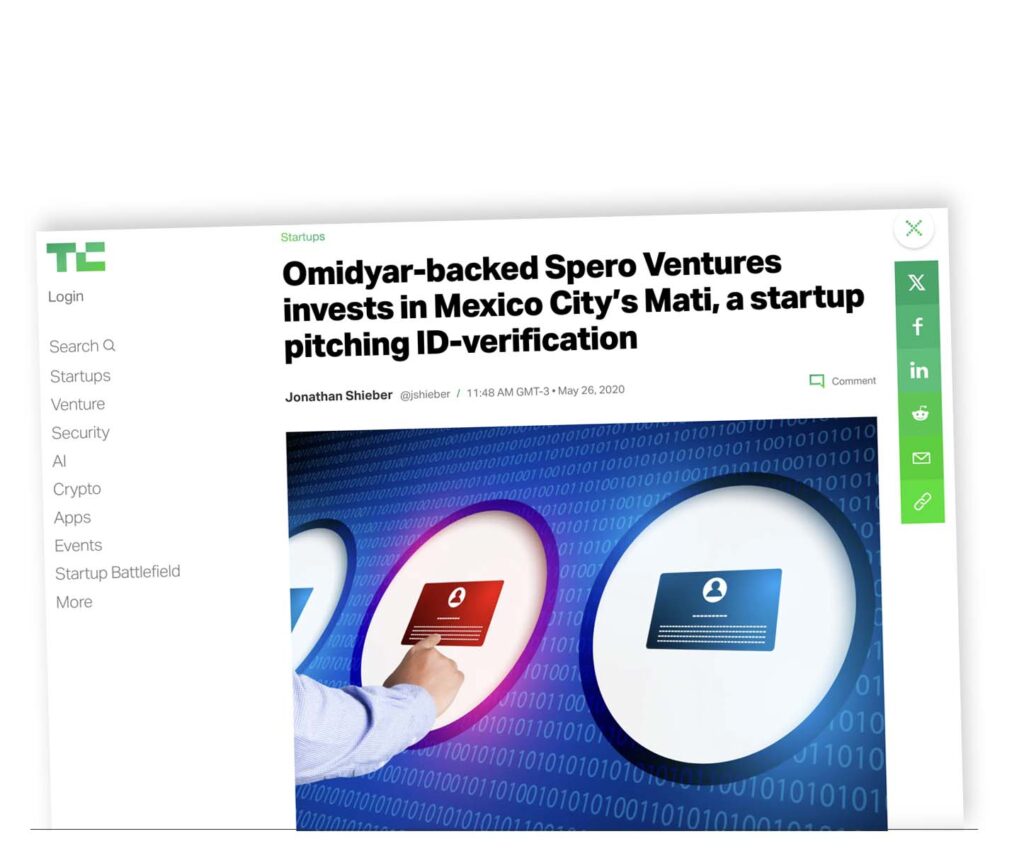
Spero Ventures invests in MetaMap, a startup pitching ID-verification

WEB ARTICLE
5 MIN READ
TechCrunch reports on Spero Ventures’ investment in MetaMap, a Mexico City-based startup specializing in identity verification.
Founded by Filip Victor in San Francisco, MetaMap relocated to Mexico to target markets with high payment fraud rates, like Mexico, Brazil, and Colombia. MetaMap’s technology serves the burgeoning fintech sector in Latin America, benefiting from the region’s evolving financial regulations.
Read the transcript of this article, published by TechCrunch on May 26, 2020.
Omidyar-backed Spero Ventures invests in Mexico City’s Mati, a startup pitching ID-verification
By Jonathan Shieber

Spero Ventures, the venture capital firm backed by eBay founder Pierre Omidyar, has gone to Mexico City for its latest investment, backing the identity verification technology developer MetaMap [formerly Mati].
Launched in San Francisco, co-founder Filip Victor decided to relocate to Mexico because of its proximity to big, untapped markets in Mexico, Brazil and Colombia.
“After developing the technology in San Francisco, we chose to start commercially in Latin America. It has been the perfect petri dish for us: the markets here, especially in Mexico, Brazil and Colombia, are very exciting. These countries have the highest payment fraud rates in the world, which makes their identity issues the most interesting,” said Victor in a statement.
The rise of a new generation of fintech startups across Latin America creates a unique opportunity for MetaMap in a number of markets — and so does a new generation of financial services regulations, the company said. “We view the fintech regulations sweeping across LatAm as an opportunity to help a lot of promising fintechs and marketplaces get to the next level,” Victor said.
Already working across three countries, with operations in Mexico City, St. Petersburg and San Francisco, Mati is an example of the global scope that even very early-stage companies can now achieve.
“The ability to have safe and trusted interactions at an unprecedented scale, especially with people in places where national identity infrastructure is limited, will create opportunities and global connections we can’t yet even forecast.”
Identity verification is at the core of much of the modern gig economy and much of the social networking defining life during a pandemic.
The company said it will use the capital investment — it would not disclose the amount of money it raised — to continue product development and expand its geographic footprint.
The scope of the identity verification problem is what brought Spero to the table to discuss an investment, according to a statement from Shripriya Mahesh, the founding partner at Spero.
“For us, identity is foundational to scaling the vast array of gig economy, fintech, social and commerce platforms that represent our collective future of work,” Mahesh said. “The ability to have safe and trusted interactions at an unprecedented scale, especially with people in places where national identity infrastructure is limited, will create opportunities and global connections we can’t yet even forecast.”
More about MetaMap
MetaMap is the digital trust and reputation layer that powers borderless growth. The company’s tools and APIs provide the infrastructure to transform anonymous strangers into trustworthy individuals in the digital economy. MetaMap offers solutions to builders across the spectrum, from developers tackling high-trust online services to enterprises bolstering their user verification and reputation processes. Founded in San Francisco in 2017, MetaMap now operates globally and is trusted by 400+ customers worldwide. To learn more, visit metamap.com.
More about Techcrunch
TechCrunch is a prominent technology news website focusing on startup companies, emerging technology, and internet products. It is known for its comprehensive coverage and industry influence.
Read the original article here.